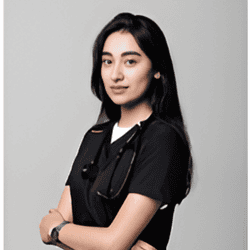
Nozimakhon Gulomova
Central Asian University, UzbekistanPresentation Title:
First Reported Cluster of Dyke–Davidoff–Masson Syndrome in Central Asia
Abstract
Dyke–Davidoff–Masson syndrome (DDMS) has been considered a medical rarity, with fewer than 100 cases reported worldwide since its first description in 1933. Most literature describes isolated or sporadic occurrences, with no established environmental or regional clustering. This has led to limited awareness of the condition in both clinical and public health domains, especially in low- and middle-income countries. This presentation aims to raise awareness of a potential regional cluster of DDMS in rural Uzbekistan and to explore common clinical and radiological patterns that may aid earlier recognition and diagnosis. Eight patients (ages 14 - 41) from socioeconomically disadvantaged communities were evaluated clinically and radiologically between 2019 and 2025. Clinical assessment included neurological examination and developmental history. MRI imaging was reviewed for hemispheric atrophy, gliosis, ventricular dilatation, and calvarial changes. All patients presented with early-onset focal seizures, contralateral hemiparesis, and varying degrees of intellectual disability and developmental delay. MRI findings consistently demonstrated unilateral cerebral atrophy, ipsilateral ventricular enlargement, cortical gliosis, skull vault thickening, and hyperpneumatization of frontal sinuses.
The majority of patients had no significant perinatal complications but reported histories of early-life infection or trauma. EEG confirmed focal epileptiform discharges in all cases. This case cluster represents the first documented series of DDMS in Central Asia. The consistent clinical-radiological pattern across multiple unrelated individuals suggests possible regional underdiagnosis and delayed access to care. Early MRI-based diagnosis and interdisciplinary management are crucial, particularly in underserved populations
Biography
Nozimakhon Gulomova has completed her medical degree at Central Asian University, one of the top institutions in Central Asia. She practiced in the Neurology Department of AKFA Medline University Hospital, the only JCI-accredited hospital in her region. With a strong interest in neurological disorders, she has authored and co-authored several articles and a book titled Neurological Disorders: Case-Based Learning and Practice, published in Germany. She is actively involved in scientific research and conference presentations, with ongoing projects focusing on botulinum toxin therapy in neurology. Her clinical and academic interests include stroke rehabilitation, headache medicine, and neurogenetic syndromes.

